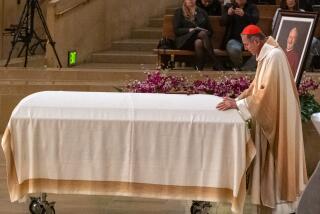An arrest in L.A. bishop’s slaying as many mourn ‘a man of peace’
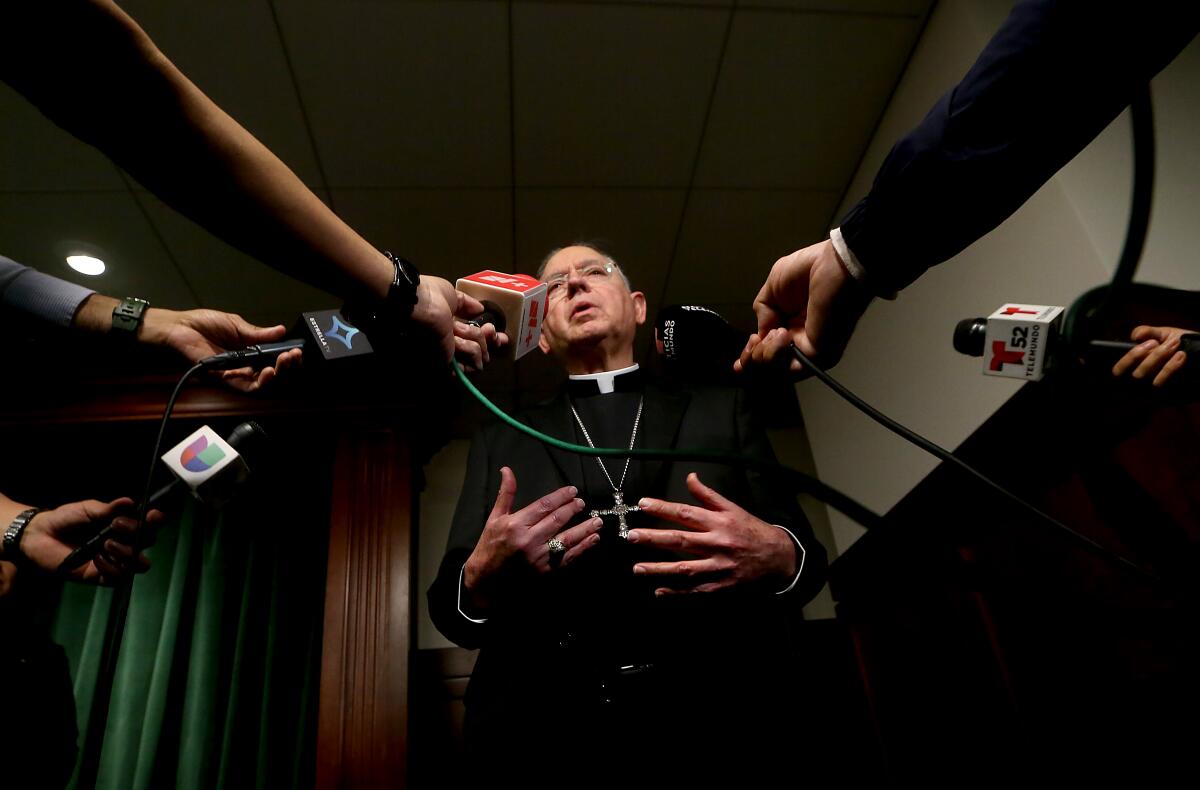
- Share via
Two days after one of the region’s most beloved clerics was shot to death inside his home, authorities arrested the husband of a housekeeper to Auxiliary Bishop David G. O’Connell following an hours-long standoff Monday at the suspect’s Torrance home.
Los Angeles County Sheriff Robert Luna identified the suspect as Carlos Medina. He did not cite a motive but said a tipster told authorities Medina was acting strangely after the killing and claimed that the bishop owed him money.
Luna said Medina is 65, but jail records gave his age as 61. He is being held in lieu of $2-million bail.
Detectives connected Medina to the crime, Luna said, by reviewing surveillance video that showed a dark, compact SUV pull into the driveway of O’Connell’s home about the time of the slaying. The sheriff added that Medina had reportedly done work at the bishop’s residence in the past.
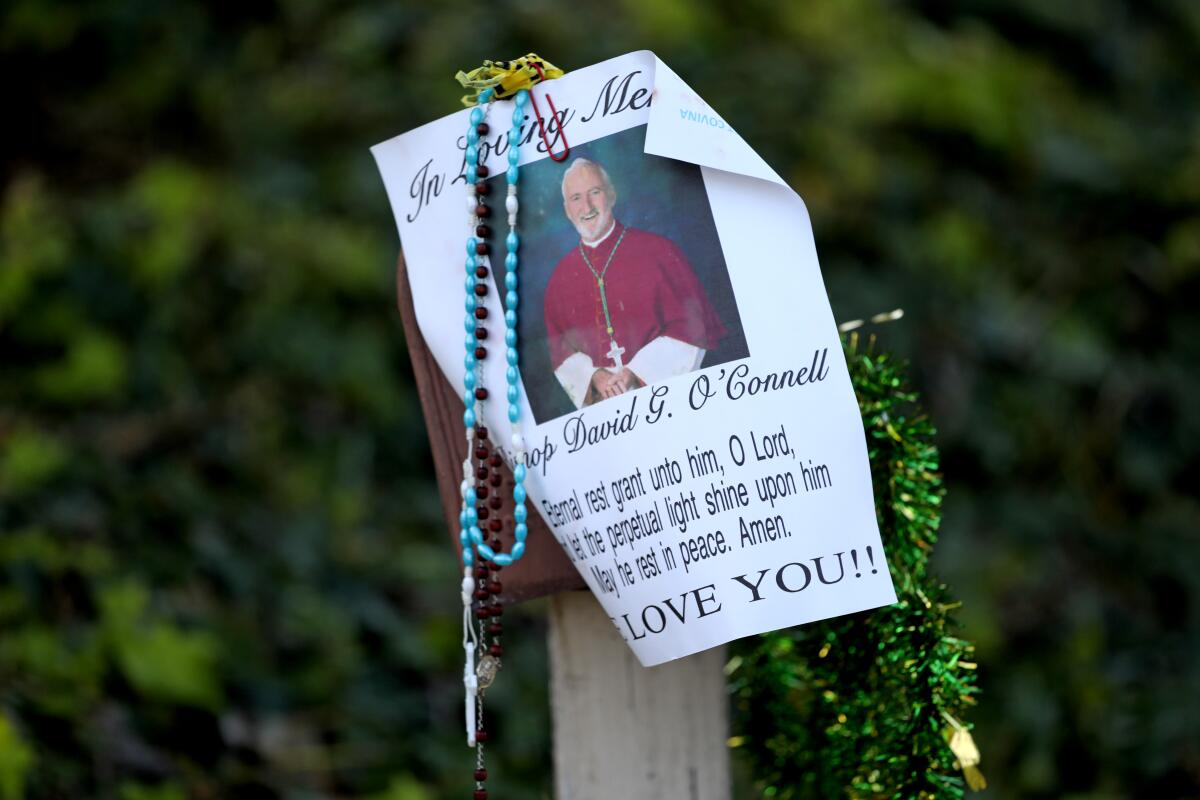
In the early-morning hours Monday, deputies went to the man’s residence in Torrance, Luna said, and Medina barricaded himself inside. After several hours, Medina left the home and was arrested. Deputies searched the home and found two guns, Luna said, noting that ballistic tests were pending.
Revelations about the shooting came during an afternoon news conference in which local officials and Los Angeles Archbishop José H. Gómez lauded O’Connell for his friendship, his selflessness and his focus on the community he had loved and served for decades.
“He was the help of the helpless and the hope of the hopeless,” said Los Angeles County Supervisor Janice Hahn, who described O’Connell as a longtime friend. “He knew that serving God meant serving man.”
O’Connell, 69, was killed Saturday afternoon in the Catholic archdiocese-owned home in Hacienda Heights where he lived alone. Luna said the bishop was found in his bedroom with “at least one gunshot wound to the upper body.” There was no sign of forced entry, Luna said, and detectives are investigating how the suspect got into the home.
Deputies answering a call for a medical emergency shortly before 1 p.m. Saturday found O’Connell, and paramedics pronounced him dead at the scene. A couple living on the quiet tree-lined street said they heard no gunshot or other unusual noise before the arrival of firefighters and ambulance crews.
Asked about who called 911 to report the incident, Luna said he believed a church deacon had gone to O’Connell’s home to check on him after O’Connell was late for a meeting. The sheriff also was asked whether authorities had spoken to the housekeeper.
“The detectives are absolutely interviewing her,” Luna said. “As far as we know at this time she’s been fully cooperative.”
Gómez fought back tears as he spoke about O’Connell — “Bishop Dave,” he called him, remembering him fondly for his fluent Spanish spoken with a distinctive Irish accent.
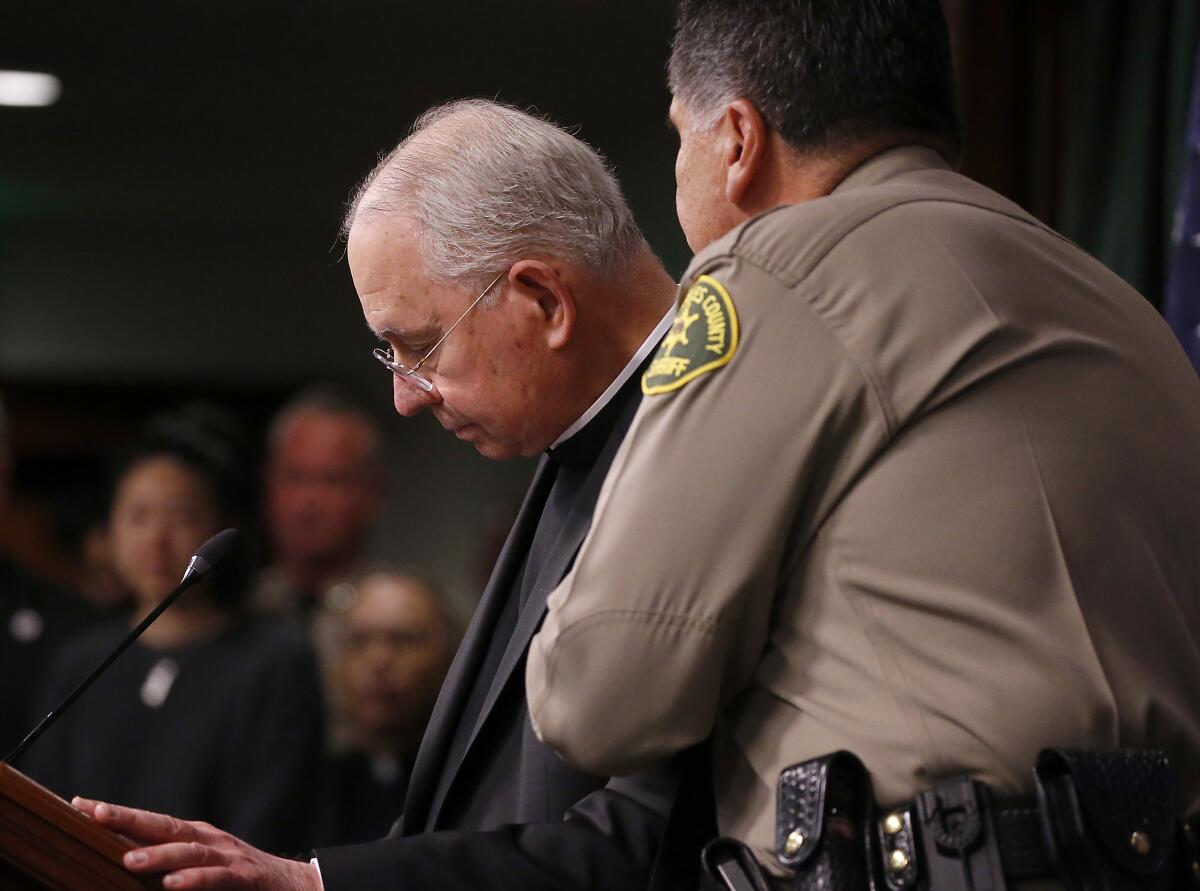
“Out of his love for God, he served this city for more than 40 years as an immigrant from Ireland,” said Gómez, an immigrant. “He was a good priest, a good bishop and a man of peace.”
The archbishop’s voice began to quiver, and he paused. The sheriff walked toward him and rested his hand on the archbishop’s shoulder.
O’Connell served as founder and chairman of the interdiocesan SoCal Immigration Task Force, helping scores of children who entered the United States without adult companions.
“For me, it really is a labor of love,” he said in 2019. “This is, I think, what our schools and parishes are all about. Not just for unaccompanied minors but for all our children. There’s an epidemic of hurting children, even the ones who have too much. They feel we’ve abandoned them. And the migrant youths have become a metaphor for our whole society.”
In the 1990s, O’Connell gained a reputation for seeking to bridge relations between residents of riot-torn neighborhoods and law enforcement after the police beating of Rodney King.
Peter Dreier, a professor of urban politics at Occidental College and author of “The Next Los Angeles: The Struggle for a Livable City,” remembered O’Connell as a progressive community organizer who put his personal charm to work for poor and disenfranchised people.
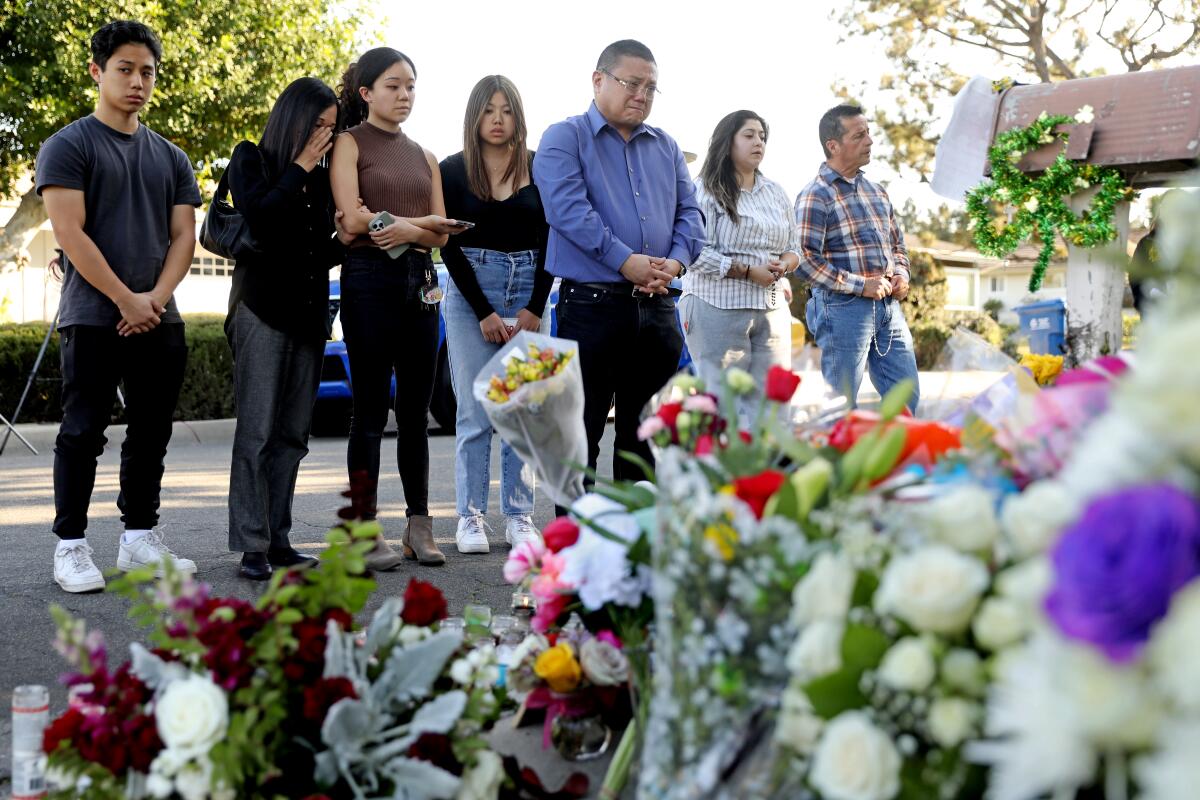
“I was always impressed with Father Dave’s street smarts, compassion, and willingness to challenge people in power around a variety of issues, including immigrant rights, housing justice, racism, and public safety,” Dreier wrote in a Facebook post. “He saw the church as a vehicle for social justice.”
Parishioners at St. Frances Xavier Cabrini Church in South Los Angeles, where O’Connell served for more than a decade, recalled a man with humor, a deep commitment to social justice and dedication to serving Black and Latino communities. They were stunned and struggling to make sense of the violence that claimed the life of someone whose calling was rooted in peace and love.
Jarlath Cunnane, pastor at St. Cornelius Catholic Church in Long Beach, met O’Connell more than 50 years ago at All Hallows College in Dublin, where they worked to become priests.
They bonded over shared interests — both studied English while at university — and Cunnane quickly came to appreciate O’Connell’s ability to deliver the perfect joke or quick-witted comment in almost any situation.
Both men moved to California, and their friendship grew deeper with the years. In 2020, when Cunnane was hospitalized for several weeks with a blood infection, O’Connell visited him almost every day. Cunnane was on an oxygen machine at the time and had a terrible taste in his mouth, he recalled, so O’Connell almost always brought him a kombucha drink when he visited.
“He had a great capacity for friendship,” he said.
The two friends met up for dinner on Thursday to catch up, Cunnane said, and they discussed plans for Cunnane to visit some parishes in O’Connell’s region. His longtime friend had not expressed anyworries about his safety, Cunnane said, so he was stunned when he learned that he’d been shot to death.
“Who on Earth would ever want to do this?” he asked.
During the Monday news conference, politicians took turns sharing memories of O’Connell, who they said had impacted the lives of countless Angelenos.
“Our bishop, your bishop,” State Sen. Bob Archuleta said, adding that O’Connell “had an ability to walk the streets, everywhere he went, bringing people together with clergy, bringing other priests together, bringing families together, gang members together. He brought everyone together. He was truly a man of the cloth.”
In a statement read by a member of her staff, Supervisor Hilda Solis described O’Connell as a dear friend, alongside whom she had long advocated for immigration reform.
“He was the real deal,” Solis wrote. “We will do as he taught us — to love, to care and to fight for the vulnerable.”
Times staff writer Michael Finnegan contributed to this report.
More to Read
Sign up for Essential California
The most important California stories and recommendations in your inbox every morning.
You may occasionally receive promotional content from the Los Angeles Times.

